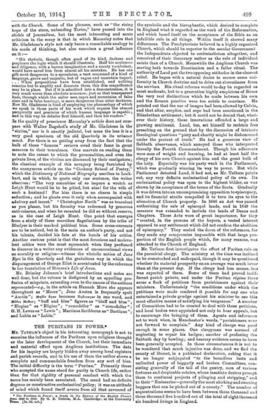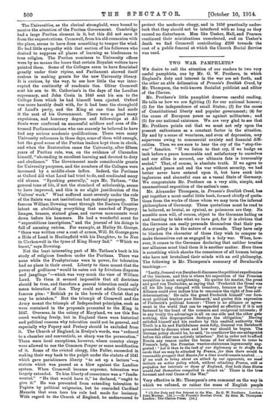THE PURITANS IN POWER.*
11B. TATHAM'S object in his interesting monograph is not to examine the influence of the Puritans upon religions thought or the later development of the Church, but their immediate and material effect upon Anglican institutions. The data for his inquiry are largely bidden away among local registers and parish records, and in his use of them the author shows a complete and commendable freedom from any sort of bias. The initial difficulty is the term " Puritan." Primarily those who accepted the name stood for purity in Church life, rather than for that rigidity of personal conduct with which the name has mainly been associated. The creed bad no definite dogmas or constructive ecclesiastical policy; it was an attitude of mind which found itself averse from all that savoured of • The Puritans in Power : a Study in the History of the Assiish Church
=
NO to 1960. By 0. B. Tatham, M.A. Cambridge: at the University
Vs. 6d. net.]
the symbolic and the hierophantio, which desired to complete in England what it regarded as the work of the Reformation, and which based itself on the acceptance of the Bible as an infallible rule in all things. Within itself it showed many differences. The Presbyterians believed in a highly organized Church, which should be superior to the secular Government the Independents objected to ecclesiasticism altogether, and conceived of their theocracy rather as the rule of individual saints than of a Church. Meanwhile the Anglican Church was moving both towards Erastianism and a fuller ritual. The authority of Laud put the two opposing attitudes in the clearest relief. He began with a natural desire to secure some uni- formity in Church doctrine and to drive out slovenliness from the services. His ritual reforms would to-day be regarded as most moderate, but to a generation highly suspicious of Rome the very real distinctions which he made between his own and the Roman practice were too subtle to convince. He pointed out that the use of images had been allowed by Calvin, and that altar, surplice, and cope had been sanctioned in the Elizabethan settlement; but it could not be denied that, what- ever their history, these innovations offended a large and growing sentiment. Laud, too, set himself to restrain free preaching on the ground that by the discussion of intricate theological questions "piety and charity might be dishonoured under the pretext of truth." He had a generous view of Sabbath observance, which annoyed those who interpreted literally the Fourth Commandment. Though his adherents were men of weight and learning, he had at least half the clergy of his own Church against him and the great bulk of the laity. Especially was his party weak in the Parliament, which was gradually winning its way to power. But while Parliament detested Laud, it had not, as Mr. Tatham points out, any very definite ecclesiastical policy of its own. Its ecclesiastical policy was open to the highest bidder, as was shown by its acceptance of the terms of the Scots. Gradually it was driven into an uncompromising opposition to episcopacy, and its financial straits compelled it to turn its eyes to the alienation of Church property. In 1646 an Act was passed authorizing the sale of episcopal lands, and in 1649 the measure was extended to include the lands of Deans and Chapters. These Acts were of great importance, for they " created, in the persons of the buyers, a vested interest opposed to any settlement which did not confirm the abolition of episcopacy." They sealed the doom of the reformers, for they made any compromise impossible with that large pro- portion of the English people which, for many reasons, was attached to the Church of England.
Mr. Tatham first investigates the effect of Puritan rule on the parochial clergy. The ministry at the time was inclined to be overstocked and underpaid, though it may be questioned whether its material prosperity on an average was much lower than at the present day. If the clergy had less means, less was expected of them. Some of them had proved indif- ferent parish priests, and under the Puritan regime there arose a flock of petitions from parishioners against their ministers. Unfortunately "the conditions under which the petitions were made rendered it possible for any one who entertained a private grudge against his minister to use this most effective means of satisfying his vengeance." A. number of Committees had to be created to deal with these petitions, and local bodies were appointed not only to hear appeals, but to encourage the bringing of them. Agents and informers set to work when, in Manchester's words, " parishioners were not forward to complain." Any kind of charge was good enough in some places. One clergyman was accused of neglecting to repair his hedges ; another of profaning the Sabbath day by bowling ; and hearsay evidence seems to have been generally accepted. In these circumstances it is not to be wondered that much injustice was done, and we find the county of Dorset, in a published declaration, asking that it be no longer subjugated "to the boundless lusts and unlimited power of beggarly and broken Committees, con- sisting generally of the tail of the gentry, men of various fortunes and despicable estates, whose insatiate desires prompt them to continual projects of pillaging and stripping," and to their " Emissaries—generally the most shirking and cunning beggars that can be picked out of a county." The number of sequestrations seems to have been between three thousand and three thousand five hundred out of the total of eight thousand six hundred livings in England.
The Universities, as the clerical stronghold, were bound to receive the attention of the Puritan Government. Cambridge had a large Puritan element in it, but this did not save it from the sequestrations. Cromwell, from his old connexion with the place, seems to have done something to temper the wind. He had little sympathy with that section of his followers who desired to suppress all places of learning as hindrances to true religion. The Puritan nominees to University offices were by no means the boors that certain Royalist writers have painted them. Some of the Colleges seem to have flourished greatly under their regime, and Parliament showed itself zealous in making grants for the new University library. It is curious, by the way, to see how little the war inter- rupted the continuity of academic ties. Oliver Cromwell sent his son to St. Catherine's in the days of the Laudian supremacy, and John Cosin in 1649 sent his son to the College from which he had himself been ejected. Oxford was more harshly dealt with, for it had been the stronghold of Laud's party, and the King at one time had made it the seat of his Government. There were a good many expulsions, and honorary degrees and fellowships at All Souls were conferred on successful soldiers and sons of dis- tressed Parliamentarians who can scarcely be believed to have had any serious academic qualifications. There were many University reformers in those days, some of them wild enough, but the good sense of the Puritan leaders kept them in check, and when the Restoration came the University, after fifteen years of Puritan rule, was, on the evidence of Clarendon himself, "abounding in excellent learning and devoted to duty and obedience." The Government made considerable grants for University purposes, and the numbers of the Colleges were increased by a middle-class influx. Indeed, the Puritans at Oxford did what Laud had tried to do, and eradicated many old abuses. "Speaking generally," says Mr. Tatham, "the general tone of life, if not the standard of scholarship, seems to have improved, and this is no slight justification of the Visitors' work." What suffered most severely under the rule of the Saints was not institutions but material property. The famous William Dowsing went through the Eastern Counties intent on abolishing everything that smacked of Popery. Images, brasses, stained glass, and carven monuments went down before his hammers. He had a wonderful scent for " superstitious inscriptions," and the journal of his doings is full of amusing entries. For example, at Hatley St. George, "there was written over a coat of armes, Will. St. George gave a Hide of Land in Haslingfield with his Daughter, to be Nun in Clerkenwell in the tyme of King Henry 2nd." " Which we burnt," says Dowsing.
Not the least interesting part of Mr. Tatham's book is his study of religious freedom under the Puritans. There was none while the Presbyterians were in power, for toleration had no place in their creed. Liberty to them meant that the power of godliness "would be eaten out by frivolous disputes and janglings "—which was very much the view of William Land. To them it seemed impossible that all doctrines should be true, and therefore a general toleration could only mean toleration of lies. They could not admit Cromwell's famous plea: " Bethink ye in the bowels of Christ that ye may be mistaken." But the triumph of Cromwell and the Army meant the triumph of Independent principles, such as were contained in the proposals presented to the King in 1647. Overseas, in the colony of Maryland, we see this fine creed working freely, but in England there were historical and political reasons why toleration could not be general, and especially why Popery and Prelacy should be excluded from it. The Church of England, in Evelyn's words, was "reduced to a chamber and conventicle, so sharp was the persecution." There were local exceptions, however, where country clergy were allowed to use the Common Prayer or some modification of it. Some of the evicted clergy, like Fuller, succeeded in making their way back to the pulpit under the statute of 1641 which gave parishioners liberty " to set up a lecture "—a statute which was passed as a blow against the Laudian system. When Cromwell became supreme, toleration was largely extended. To him liberty of conscience was a " funda- mental." " He that would have it," he declared, "ought to give it." He was prevented from extending toleration to Papists by political exigencies, but he reminded Cardinal Mazarin that even here his rule had made for leniency. With regard to the Church of England, he endeavoured to protect the moderate clergy, and in 1656 practically under- took that they should not be interfered with so long as they caused no disturbance. Men like Ussher, Hall, and Pearson continued their ministrations unmolested, and on Ussher's death we find Cromwell contributing £200 towards the cost of a public funeral at which the Church Burial Service was used.



































 Previous page
Previous page